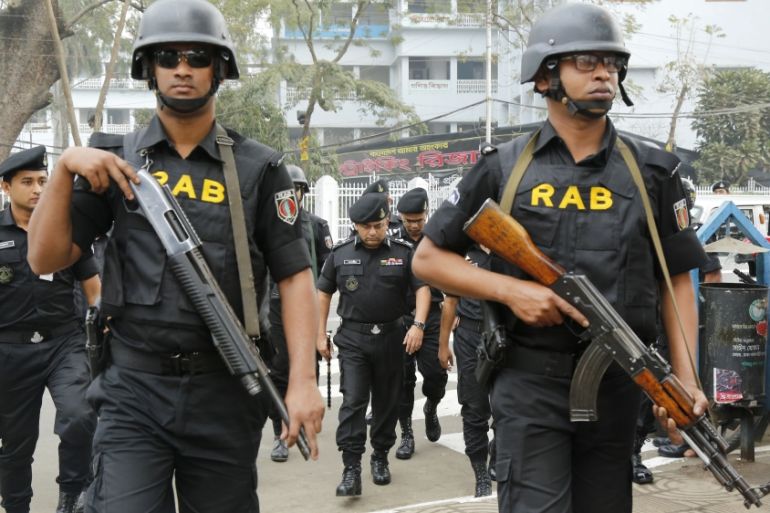UN blasts Bangladesh over extrajudicial killings
Dhaka criticised for ‘high rate’ of extrajudicial killings, enforced disappearances, and excessive force in new report.

Dhaka, Bangladesh – The United Nations has criticised Bangladesh’s government in a new report for a “high rate” of extrajudicial killings and enforced disappearances, as well as “excessive use of force by state actors”.
The report’s publication on Tuesday came a month after the United Nations Working Group on Involuntary and Enforced Disappearances called on the government to “immediately reveal the whereabouts” of three sons of opposition leaders it says were kidnapped six months earlier.
Keep reading
list of 4 itemsG7 countries slam Chinese firms’ support for Russia’s defence industry
The Take: What would a third Modi term mean for India?
Israeli minister suggests reported attack on Iran was ’feeble’
One week later, one of the men, Hummam Quader Chowdhury, was released on the streets of the capital Dhaka, but the other two – lawyer Mir Ahmed bin Quasem and Brigadier-General Abdullahil Amaan al-Azmi – reportedly remain in secret state detention.
Chowdhury, Quasem and Azmil are linked to either the opposition Bangladesh Nationalist Party or Jamaat-e-Islami, and each of their fathers has been convicted and executed by the International Crimes Tribunal.
The UN Human Rights Committee – which comprises independent experts who monitor states’ compliance with their obligations under the International Covenant on Civil and Political Rights – also called on the Bangladesh government to repeal or amend various laws that restrict freedom of expression and legalise certain child marriages.
Concern over missing sons of Bangladeshi politicians
Bangladesh ratified the international convention in 2000, but various governments failed until 2015 to furnish the committee with a compliance report, which had been due a year after ratification.
In its official response to the criticism, the Bangladesh government wrote to the committee stating the “country context, realities and the limitations of Bangladesh may not have been adequately appreciated” by the committee. It added efforts by the government in seeking to implement the convention “might not have been recognised enough”.
The government also said discussions the committee held with Bangladesh’s Law Minister Anisul Huq earlier in the month were “not duly reflected in the concluding observations”.
‘Establish the truth’
|
|
In its report, the UN committee said the Bangladesh government must “investigate all cases of arbitrary killings, enforced disappearances, and excessive use of force, prosecute and if convicted, punish the perpetrators with appropriate sanctions, and provide full reparation to the victims”.
It relation to disappearances, the UN committee said the government “should establish the truth about the fate and the whereabouts of the victims, and ensure that victims of enforced disappearance and their relatives are informed about the outcome of the investigation”.
“Our government has taken meaningful actions to bring such incidents of human rights violations to a very low level,” Huq said in a statement to the UN committee.
He also said the government “maintains zero-tolerance approach with respect to any crime committed by the law enforcement agencies”.
Bangladesh: Sons of convicted war criminals detained
Since the current Awami League government came to power in 2009, human rights organisations in Bangladesh have identified more than 1,300 alleged extrajudicial killings and 325 enforced disappearances.
Similar high levels of killings were also reported under the previous Bangladesh Nationalist Party government.
The UN committee also criticised the arrest of at least 35 journalists, secular bloggers, and human rights defenders in 2016 under a law the Information and Communications Technology Act 2006.
The committee also raised concerns about the government’s recently enacted child marriage law, which allows girls under the age of 18 to get married in “special circumstances”.
The UN experts said the government should amend the Child Marriage Restraint Act “to maintain the legal minimum age of marriage for girls at 18 years, in accordance with international norms, without any exceptions”.
|
|